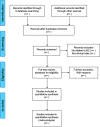Acupuncture for biliary colic: a systematic review protocol
- PMID: 33455934
- PMCID: PMC7813305
- DOI: 10.1136/bmjopen-2020-041931
Acupuncture for biliary colic: a systematic review protocol
Abstract
Introduction: Biliary colic (BC) is a severe pain associated with nausea and vomiting, which is the most common symptom among the gallstone population. This protocol proposes a methodology for conducting a systematic review and meta-analysis that aims to assess the benefits and safety of acupuncture in patients with BC.
Methods and analysis: Clinical trials will be identified through nine databases from inception to December 2020, using Cochrane Central Register of Controlled Trials (CENTRAL), MEDLINE, Embase, Allied and Complementary Medicine Database (AMED), CINAHL, China National Knowledge Infrastructure (CNKI), Chinese Biomedical Literature Database (CBM), VIP Database and Wanfang Database. Search words will be used for the BC and acupuncture. The analysis would include randomised, controlled, clinical trials of adults with BC that were published in either Chinese or English. The primary outcome is to measure pain relief. Two or three reviewers should be in charge of study selection, data extraction and evaluating the risk of bias. RevMan software (V.5.4) will be used to perform the assessment of the risk of bias and data synthesis.
Ethics and dissemination: Ethics approval will not be required for this review, as it will only involve the collection of literature previously published. The results of this meta-analysis will be disseminated in a peer-reviewed journal or relevant conference, through publication.
Trial registration number: CRD42020167510.
Keywords: clinical trials; complementary medicine; health & safety; pain management.
© Author(s) (or their employer(s)) 2021. Re-use permitted under CC BY-NC. No commercial re-use. See rights and permissions. Published by BMJ.
Conflict of interest statement
Competing interests: None declared.
Figures
References
Publication types
MeSH terms
LinkOut - more resources
Full Text Sources
Other Literature Sources
Medical

